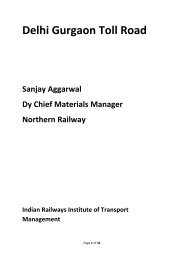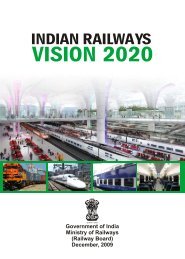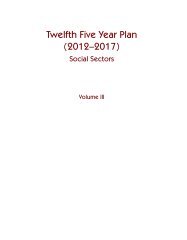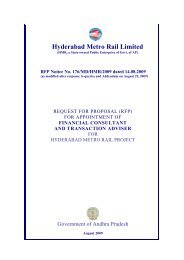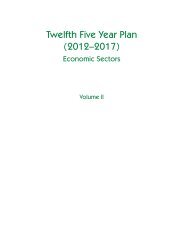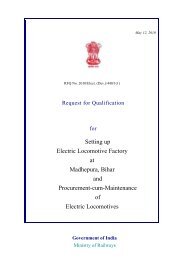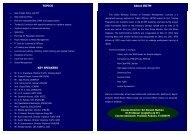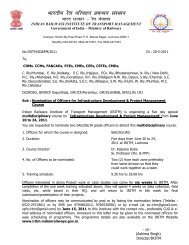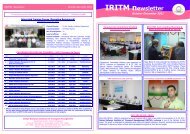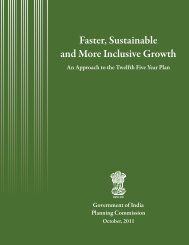Station Inspection_Mintenance Block - Indian Railways Institute of ...
Station Inspection_Mintenance Block - Indian Railways Institute of ...
Station Inspection_Mintenance Block - Indian Railways Institute of ...
You also want an ePaper? Increase the reach of your titles
YUMPU automatically turns print PDFs into web optimized ePapers that Google loves.
Thursday, April 25, 2013 INDRA GHOSH, COM/NR Slide No. 1
Welcome to a Lecture on<br />
STATION INSPECTIONS<br />
MAINTENANCE BLOCKS<br />
CAUTION ORDERS &<br />
THEIR MONITORING<br />
Tele : +91 – 11 – 2338 – 7976<br />
Mobile : +91 – 97176 – 30900<br />
E – Mail : indra<strong>of</strong>fice@gmail.com<br />
by :<br />
INDRA GHOSH<br />
COM/NR<br />
Thursday, April 25, 2013 INDRA GHOSH, COM/NR Slide No. 2
DISCLAIMER<br />
Views expressed in this lecture are that<br />
<strong>of</strong> the speaker and may not necessarily<br />
reflect the <strong>of</strong>ficial views <strong>of</strong> either<br />
Northern Railway or <strong>of</strong> the Railway<br />
Board.<br />
Thursday, April 25, 2013 INDRA GHOSH, COM/NR Slide No. 3
Outline <strong>of</strong> the Lecture<br />
• <strong>Station</strong> inspections.<br />
• Maintenance blocks.<br />
• Caution orders & their monitoring.<br />
Thursday, April 25, 2013 INDRA GHOSH, COM/NR Slide No. 4
Outline <strong>of</strong> the Lecture<br />
• <strong>Station</strong> inspections.<br />
• Maintenance blocks.<br />
• Caution orders & their monitoring.<br />
Thursday, April 25, 2013 INDRA GHOSH, COM/NR Slide No. 5
• <strong>Station</strong> inspections.<br />
Outline <strong>of</strong> the Lecture<br />
Thursday, April 25, 2013 INDRA GHOSH, COM/NR Slide No. 6
<strong>Station</strong> inspections<br />
• The safety edifice <strong>of</strong> IR is supported by a system <strong>of</strong><br />
inspections that has been steadily built up over 150 years.<br />
• To that extent, improvement in safety is directly<br />
proportionate to the frequency and quality <strong>of</strong> inspections<br />
carried out in the field.*<br />
• It is essential that systems prescribed are constantly<br />
monitored to confirm that they are being followed<br />
meticulously without resort to short cut methods.**<br />
Thursday, April 25, 2013 INDRA GHOSH, COM/NR Slide No. 7
<strong>Station</strong> inspections<br />
• Unfortunately, the system <strong>of</strong> carrying out inspections has<br />
gradually fallen into disuse, and<br />
– the technique <strong>of</strong> conducting purposeful inspections<br />
has been forgotten.*<br />
Thursday, April 25, 2013 INDRA GHOSH, COM/NR Slide No. 8
<strong>Station</strong> inspections<br />
• Unfortunately, the system <strong>of</strong> carrying out inspections has<br />
gradually fallen into disuse, and<br />
– the technique <strong>of</strong> conducting purposeful inspections is<br />
being forgotten.*<br />
• This has partially been brought about as a result <strong>of</strong> the<br />
revolution in railway operations by means <strong>of</strong> block rake<br />
movement in early 1980s.<br />
• In the pre – 1980 era, sprawling marshalling yards, huge<br />
transhipment sheds, big goods terminals along with<br />
numerous smaller yards, pilots and shunting engines were<br />
focal points <strong>of</strong> railway operations.*<br />
Thursday, April 25, 2013 INDRA GHOSH, COM/NR Slide No. 9
<strong>Station</strong> inspections<br />
• <strong>Block</strong> rake movements have transformed railway<br />
operations like never before and made them control <strong>of</strong>fice<br />
centric.*<br />
• Officers can now manage operations well enough without<br />
facing the rigours <strong>of</strong> outdoor field inspections.<br />
• This has resulted in an increasing tendency to relegate<br />
field inspections to a secondary level <strong>of</strong> importance.<br />
• It is for this reason that the age – old system <strong>of</strong><br />
inspections needs to be put on a sound footing for<br />
ensuring safety <strong>of</strong> train operations.<br />
Thursday, April 25, 2013 INDRA GHOSH, COM/NR Slide No. 10
<strong>Station</strong> inspections<br />
• Shri M. S. Gujral’s comments on the importance <strong>of</strong><br />
inspections :<br />
• <strong>Inspection</strong>s conducted at various levels serve multifarious<br />
purposes.<br />
• Periodic inspections check utility and effectiveness <strong>of</strong><br />
extant orders and existing systems;<br />
– as also ensure that working practices are as per laid<br />
down rules and procedures.<br />
Thursday, April 25, 2013 INDRA GHOSH, COM/NR Slide No. 11
<strong>Station</strong> inspections<br />
• Shri M. S. Gujral’s comments on the importance <strong>of</strong><br />
inspections :<br />
• <strong>Inspection</strong>s conducted at various levels serve multifarious<br />
purposes.<br />
• Periodic inspections check utility and effectiveness <strong>of</strong><br />
extant orders and existing systems;<br />
– as also ensure that working practices are as per laid<br />
down rules and procedures.<br />
• Surprise inspections curb the tendency amongst staff <strong>of</strong><br />
following short cut methods or adopting unsafe practices;<br />
– they also instil a sense <strong>of</strong> alertness and fear amongst<br />
them.<br />
Thursday, April 25, 2013 INDRA GHOSH, COM/NR Slide No. 12
<strong>Station</strong> inspections<br />
• Shri M. S. Gujral’s comments on the importance <strong>of</strong><br />
inspections :<br />
• In addition to above, routine inspections are invaluable<br />
for<br />
– fault detection,<br />
– timely correction,<br />
– on the spot counselling and<br />
– redressal <strong>of</strong> staff grievances.<br />
Thursday, April 25, 2013 INDRA GHOSH, COM/NR Slide No. 13
<strong>Station</strong> inspections<br />
• Shri M. S. Gujral’s comments on the importance <strong>of</strong><br />
inspections :<br />
• In addition to above, routine inspections are invaluable<br />
for<br />
– fault detection,<br />
– timely correction,<br />
– on the spot counselling and<br />
– redressal <strong>of</strong> staff grievances.<br />
• Last but not the least, field inspections are possibly the<br />
best means available for bringing about long term systems<br />
improvement.<br />
Thursday, April 25, 2013 INDRA GHOSH, COM/NR Slide No. 14
<strong>Station</strong> inspections<br />
• Accident inquiries indicate that accidents caused by staff<br />
are attributable less to their lack <strong>of</strong> knowledge <strong>of</strong><br />
rules/procedures and<br />
– more to their negligence/carelessness in observing<br />
them.<br />
Thursday, April 25, 2013 INDRA GHOSH, COM/NR Slide No. 15
<strong>Station</strong> inspections<br />
• Accident inquiries indicate that accidents caused by staff<br />
are attributable less to their lack <strong>of</strong> knowledge <strong>of</strong><br />
rules/procedures and<br />
– more to their negligence/carelessness in observing<br />
them.<br />
• This is further compounded by failure <strong>of</strong> their supervisors<br />
to detect these in time by close detailed checks and to<br />
rectify the same.*<br />
• Similarly, failure <strong>of</strong> <strong>of</strong>ficers to detect such slack<br />
supervision on the part <strong>of</strong> front line inspectors leads to<br />
system failure.**<br />
Thursday, April 25, 2013 INDRA GHOSH, COM/NR Slide No. 16
<strong>Station</strong> inspections<br />
• Conducting an effective inspection is both a science and<br />
an art.*<br />
• In railway working, example set by management goes a<br />
long way in setting right systems.<br />
• Therefore it is imperative that management sets an<br />
example by means <strong>of</strong> their personal actions.<br />
• Example set by senior <strong>of</strong>ficers are picked up and followed<br />
by middle level <strong>of</strong>ficers.<br />
• Similarly, examples set by branch <strong>of</strong>ficers are emulated<br />
by asstt. <strong>of</strong>ficers/supervisors.<br />
Thursday, April 25, 2013 INDRA GHOSH, COM/NR Slide No. 17
<strong>Station</strong> inspections<br />
• Why do accidents occur?*<br />
• Most accidents occur during abnormal working.*<br />
• How do we prevent accidents?*<br />
• No accident occurs in isolation. Champa accident.*<br />
• <strong>Inspection</strong>s are the most effective means <strong>of</strong> prevention.<br />
• Footplate on GZB – MB section.*<br />
• Unsafe practices and shortcut methods have to be taken<br />
up with a firm hand.*<br />
• In case <strong>of</strong> asset failures, ensuring safety comes first.*<br />
• Department which are responsible for maintaining the<br />
asset will answer for train detention.*<br />
• Counselling <strong>of</strong> both supervisory and frontline staff.<br />
Thursday, April 25, 2013 INDRA GHOSH, COM/NR Slide No. 18
̶<br />
̶<br />
̶<br />
̶<br />
<strong>Station</strong> inspections<br />
• 5 effective inspections in a month by each operating<br />
<strong>of</strong>ficer* is good enough to ensure safety.*<br />
– 1 footplate (by rotation).<br />
– 1 motor trolley.* This should cover station, cabin,<br />
traffic L-Xing gate etc.<br />
– 1 night inspection by road.<br />
– 2 miscellaneous inspections.*<br />
Lobby.<br />
Running Room.<br />
<strong>Station</strong> yard.<br />
Private siding.<br />
Thursday, April 25, 2013 INDRA GHOSH, COM/NR Slide No. 19
̶<br />
̶<br />
̶<br />
̶<br />
<strong>Station</strong> inspections<br />
• 5 effective inspections in a month by each operating<br />
<strong>of</strong>ficer* is good enough to ensure safety.*<br />
– 1 footplate (by rotation).<br />
– 1 motor trolley.* This should cover station, cabin,<br />
traffic L-Xing gate etc.<br />
– 1 night inspection by road.<br />
– 2 miscellaneous inspections.*<br />
Lobby.<br />
Running Room.<br />
<strong>Station</strong> yard.<br />
Private siding.<br />
• 2 days and 1 night is adequate for above inspections.**<br />
Thursday, April 25, 2013 INDRA GHOSH, COM/NR Slide No. 20
<strong>Station</strong> inspections<br />
Type <strong>of</strong> inspection<br />
1 st day 2 nd day 1 st Night Total<br />
Footplate 1 1<br />
<strong>Station</strong> – detailed 1 1<br />
Miscellaneous – lobby 1 1<br />
Motor trolley :<br />
<strong>Station</strong> – casual 3 3<br />
Level crossing 2 2<br />
Night inspection by road<br />
<strong>Station</strong> 2 2<br />
Level crossing 1 1<br />
Footplate* 1 1<br />
Thursday, April 25, 2013 INDRA GHOSH, COM/NR Slide No. 21
<strong>Station</strong> inspections<br />
• Verify whether every employee is fully conversant with<br />
rules, instructions and procedures relating to his duties,<br />
– especially with respect to abnormal working.<br />
Thursday, April 25, 2013 INDRA GHOSH, COM/NR Slide No. 22
<strong>Station</strong> inspections<br />
• Verify whether every employee is fully conversant with<br />
rules, instructions and procedures relating to his duties,<br />
– especially with respect to abnormal working.<br />
• Ascertain that staff are performing their duties according<br />
to rules, instructions and procedures in force.<br />
• Ascertain that registers, documents and other records are<br />
being maintained and preserved according to instructions.<br />
• Inculcate discipline and build up the morale <strong>of</strong> the<br />
workers.<br />
• Check compliance <strong>of</strong> previous inspection reports <strong>of</strong><br />
<strong>of</strong>ficers.<br />
• Analyse performance vis-à-vis target.<br />
Thursday, April 25, 2013 INDRA GHOSH, COM/NR Slide No. 23
<strong>Station</strong> inspections<br />
• Detect undesirable shortcuts, irregularities or unsafe<br />
practices being resorted to by the staff taking remedial<br />
action which may be :<br />
– (a) Educative, in case these are resorted to out <strong>of</strong><br />
ignorance.<br />
– (b) Corrective, if there is something wrong in the<br />
working conditions, or there are system deficiencies.<br />
– (c) Punitive, if resorted to wilfully, negligently or<br />
persistently even after repeated guidance and<br />
counseling.<br />
Thursday, April 25, 2013 INDRA GHOSH, COM/NR Slide No. 24
<strong>Station</strong> inspections<br />
• Casual <strong>Inspection</strong> should be started by taking a round <strong>of</strong><br />
the station yard, understanding the system <strong>of</strong> working,<br />
– including reception and despatch <strong>of</strong> trains, shunting<br />
procedures, facilities for simultaneous movements etc.<br />
Thursday, April 25, 2013 INDRA GHOSH, COM/NR Slide No. 25
<strong>Station</strong> inspections<br />
• Casual <strong>Inspection</strong> should be started by taking a round <strong>of</strong><br />
the station yard, understanding the system <strong>of</strong> working,<br />
– including reception and despatch <strong>of</strong> trains, shunting<br />
procedures, facilities for simultaneous movements etc.<br />
• These should then be cross checked with the provisions<br />
available in the <strong>Station</strong> Working Rules.<br />
• Thereafter, safety inspection <strong>of</strong> the ASM’s <strong>of</strong>fice should<br />
be undertaken.<br />
• <strong>Inspection</strong> <strong>of</strong> various Books and Registers should be<br />
undertaken sequentially so that nothing is missed.<br />
Thursday, April 25, 2013 INDRA GHOSH, COM/NR Slide No. 26
<strong>Station</strong> inspections<br />
• The idea should be to conduct a thorough check <strong>of</strong><br />
whatever areas are picked up.<br />
• In case <strong>of</strong> lack <strong>of</strong> time, it would be better to leave out<br />
some aspects <strong>of</strong> working altogether rather than try and<br />
cover everything in a slipshod manner.<br />
• The subjects that should be taken up in the decreasing<br />
order <strong>of</strong> their importance are as follows :<br />
– Registers <strong>of</strong> staff,<br />
– Train passing books and registers,<br />
– S&T books and registers,<br />
– Engineering books and registers,<br />
– other safety books and registers.<br />
Thursday, April 25, 2013 INDRA GHOSH, COM/NR Slide No. 27
<strong>Station</strong> inspections<br />
• My system has been to thoroughly scrutinize the Sectional<br />
TI’s <strong>Inspection</strong> Register.*<br />
• Last 2 detailed inspections conducted by the Sectional TI<br />
are gone through.<br />
• During detailed inspection a Sectional TI is supposed to<br />
check each and every register, form and document for the<br />
period since his last detailed inspection.<br />
• All registers, forms and documents that the TI has<br />
recorded as checked and found correct are gone through.<br />
• Two consecutive detailed inspection notes should be gone<br />
through to see whether same mistakes have been repeated.<br />
Thursday, April 25, 2013 INDRA GHOSH, COM/NR Slide No. 28
<strong>Station</strong> inspections<br />
• Some <strong>of</strong> the shortcomings noticed during station<br />
inspections.<br />
• TI’s inspection register – index.<br />
• Last 2 inspections – 10 th January and 15 th March.<br />
• Supposed to inspect all forms and registers from the time<br />
<strong>of</strong> his last inspection till the current date.<br />
– Inspected from 11 th January till 15 th March.<br />
– Serial nos. 12345 till 12351.<br />
– Following discrepancies noticed :<br />
– Sn. 12347 – time not mentioned – name <strong>of</strong> staff .<br />
– Sn. 12349 – signature not taken – name <strong>of</strong> staff.<br />
Thursday, April 25, 2013 INDRA GHOSH, COM/NR Slide No. 29
<strong>Station</strong> inspections<br />
• Compliance written as “TI/SWR informed”.*<br />
• Interim compliance to be written in pencil. Only after the<br />
final compliance has been obtained should entries be<br />
made in ink.<br />
• Two advantages :<br />
– Firstly, an inspecting <strong>of</strong>ficial can note that this<br />
particular item has not been complied with.<br />
– Secondly, Sectional TI during his next inspection<br />
will again note this down as unimplemented.<br />
Thursday, April 25, 2013 INDRA GHOSH, COM/NR Slide No. 30
<strong>Station</strong> inspections<br />
• Compliance written as “TI/SWR informed”.*<br />
• Interim compliance to be written in pencil. Only after the<br />
final compliance has been obtained should entries be<br />
made in ink.<br />
• Two advantages :<br />
– Firstly, an inspecting <strong>of</strong>ficial can note that this<br />
particular item has not been complied with.<br />
– Secondly, Sectional TI during his next inspection<br />
will again note this down as unimplemented.<br />
• Special report to Sr. DOM on items which carry on for<br />
more than 2 detailed inspections.<br />
Thursday, April 25, 2013 INDRA GHOSH, COM/NR Slide No. 31
<strong>Station</strong> inspections<br />
• Night <strong>Inspection</strong>* :<br />
– Select aspects <strong>of</strong> night working to be inspected.*<br />
– Route chart.<br />
– Sleeping on duty.*<br />
– Incognito inspection.<br />
– Checking alertness <strong>of</strong> staff <strong>of</strong> adjoining work spots.<br />
– Impersonating the porter.*<br />
– Visibility <strong>of</strong> signals.<br />
– Alertness <strong>of</strong> running staff <strong>of</strong> through passing trains.*<br />
– Attitude <strong>of</strong> section controller.*<br />
– Testing the knowledge <strong>of</strong> staff.<br />
– Graded system <strong>of</strong> responsibility.<br />
Thursday, April 25, 2013 INDRA GHOSH, COM/NR Slide No. 32
<strong>Station</strong> inspections<br />
• Safety Meeting Register.<br />
• Registers are casually filled up.<br />
• Attendance <strong>of</strong> staff is poor.<br />
• Staff attendance shown but physically not attended the<br />
meeting.<br />
• Staff on being questioned are unable to explain what was<br />
supposed to have been discussed.<br />
• Topics being given by hdqrts. depending on latest<br />
accidents.*<br />
Thursday, April 25, 2013 INDRA GHOSH, COM/NR Slide No. 33
̶<br />
̶<br />
̶<br />
<strong>Station</strong> inspections<br />
• Relay Room Register :<br />
Cutting and overwriting in relay room opening<br />
register.<br />
Purpose <strong>of</strong> opening <strong>of</strong> relay room not being entered in<br />
register.<br />
Opening <strong>of</strong> relay room for long durations observed.<br />
Thursday, April 25, 2013 INDRA GHOSH, COM/NR Slide No. 34
̶<br />
̶<br />
<strong>Station</strong> inspections<br />
• Signal Failure Register :<br />
Cross checking with T-369 (3b) and SI-26, it was<br />
observed that entries <strong>of</strong> individual failures not<br />
being entered in the register.<br />
Delayed compliance <strong>of</strong> items noted in joint<br />
inspection <strong>of</strong> point and crossing.<br />
Thursday, April 25, 2013 INDRA GHOSH, COM/NR Slide No. 35
̶<br />
̶<br />
̶<br />
<strong>Station</strong> inspections<br />
• Disconnection Register :<br />
Reason, date and time not being recorded.<br />
Dis-connection/Re-connection memo not being<br />
pasted properly in register.<br />
Name <strong>of</strong> S&T gear dis-connected and points/signals<br />
affected are not always indicated in the notice.*<br />
Thursday, April 25, 2013 INDRA GHOSH, COM/NR Slide No. 36
<strong>Station</strong> inspections<br />
• Switch clamps. Fixing near point machines.*<br />
• If necessary fix 2 clamps close to each other.<br />
• Indenting for new clamps.*<br />
• Review requirement <strong>of</strong> switch clamps mentioned in SWR.<br />
• No train operations should be carried out during a failure<br />
till all safety precautions have been taken as per rule.*<br />
Thursday, April 25, 2013 INDRA GHOSH, COM/NR Slide No. 37
<strong>Station</strong> inspections<br />
• At many stations ASMs are habitual <strong>of</strong> exchanging duty,<br />
sometimes performing for 16 hrs without break.<br />
• Safety consciousness <strong>of</strong> controllers.*<br />
Thursday, April 25, 2013 INDRA GHOSH, COM/NR Slide No. 38
<strong>Station</strong> inspections<br />
• Earlier most accidents on traffic account were due to<br />
reception <strong>of</strong> train on blocked line.*<br />
• At present, most accidents on traffic account are due to<br />
mis – manipulation <strong>of</strong> panels<br />
• Many staff don’t understand intricacies <strong>of</strong> panel working.<br />
– Leave alone, emergency operation <strong>of</strong> panel.<br />
• They are barely able to operate the panel for normal<br />
working provided there are no failures.<br />
• Opening <strong>of</strong> Relay Room.*<br />
• SMSs to TIs to SMs to remaining staff.*<br />
• Special training to staff who are weak by some <strong>of</strong> the<br />
better TIs.<br />
Thursday, April 25, 2013 INDRA GHOSH, COM/NR Slide No. 39
<strong>Station</strong> inspections<br />
• Database <strong>of</strong> inspections.<br />
• We have to function through supervisory staff.*<br />
• System failures in jurisdiction <strong>of</strong> same TI.<br />
• Shortcomings noticed in the jurisdiction <strong>of</strong> one sectional<br />
TI should be informed to other sectional TIs during<br />
periodic operating meeting.*<br />
• Emphasis should be more on educating the staff, rather<br />
than on fault finding.<br />
• In case <strong>of</strong> repeated failures supervisors to be taken up.*<br />
Thursday, April 25, 2013 INDRA GHOSH, COM/NR Slide No. 40
<strong>Station</strong> inspections<br />
• First Line.<br />
• AAA.<br />
• BBB.<br />
• CCC.<br />
• DDD.<br />
• EEE.<br />
• FFF.<br />
• GGG.<br />
• HHH.<br />
• III.<br />
• JJJ.<br />
• Last Line.<br />
Thursday, April 25, 2013 INDRA GHOSH, COM/NR Slide No. 41
• <strong>Station</strong> inspections.<br />
• Maintenance blocks.<br />
Outline <strong>of</strong> the Lecture<br />
Thursday, April 25, 2013 INDRA GHOSH, COM/NR Slide No. 42
Maintenance blocks<br />
• From the Civil Engineering departments point <strong>of</strong> view,<br />
requirement <strong>of</strong> blocks is a bottomless pit.<br />
• Monthly Joint Statement is prepared as follows :<br />
– Demanded 100 hrs.<br />
– Granted 60 hrs.<br />
– % <strong>of</strong> block granted 60%.<br />
Thursday, April 25, 2013 INDRA GHOSH, COM/NR Slide No. 43
Maintenance blocks<br />
• From the Civil Engineering departments point <strong>of</strong> view,<br />
requirement <strong>of</strong> blocks is a bottomless pit.<br />
• Monthly Joint Statement is prepared as follows :<br />
– Demanded 100 hrs.<br />
– Granted 60 hrs.<br />
– % <strong>of</strong> block granted 60%.<br />
• Despite only 60% <strong>of</strong> block being granted, all targets <strong>of</strong><br />
civil engineering department are met with.*<br />
• Exaggerated demands.*<br />
• Repeated demand if block not granted on a particular<br />
day.*<br />
Thursday, April 25, 2013 INDRA GHOSH, COM/NR Slide No. 44
Maintenance blocks<br />
• Northern Railway’s system <strong>of</strong> calculating requirement <strong>of</strong><br />
maintenance blocks for Track Machines.<br />
Thursday, April 25, 2013 INDRA GHOSH, COM/NR Slide No. 45
Maintenance blocks<br />
• Optimum requirement <strong>of</strong> block for all types <strong>of</strong><br />
maintenance works :<br />
– 100 kms. section.<br />
– 12 stations.<br />
– 100 L – Xings.<br />
Thursday, April 25, 2013 INDRA GHOSH, COM/NR Slide No. 46
Maintenance blocks<br />
• Optimum requirement <strong>of</strong> block for all types <strong>of</strong><br />
maintenance works :<br />
– 100 kms. section.<br />
– 12 stations.<br />
– 100 L – Xings.<br />
• Since requirement <strong>of</strong> civil engg. department would be<br />
maximum, their annual requirement <strong>of</strong> maintenance<br />
blocks has been worked out.*<br />
• Requirement <strong>of</strong> other departments would be<br />
comparatively less and hence their requirement can be<br />
adjusted within the requirement <strong>of</strong> blocks by civil engg.<br />
department.<br />
Thursday, April 25, 2013 INDRA GHOSH, COM/NR Slide No. 47
Maintenance blocks<br />
• Goose which laid the Golden Eggs.<br />
• For IR, whose end result is transport output, both<br />
production and production capacity are important, and<br />
must be well looked after .<br />
• Prudence demands that production capacity <strong>of</strong> an asset<br />
must be maintained in good health in the long-term<br />
interest <strong>of</strong> the organisation.<br />
• At the same time it must also be realised that granting <strong>of</strong><br />
maintenance blocks has a cost attached to it.<br />
• While the cost can be worked out for each individual<br />
section, it would generally vary.*<br />
Thursday, April 25, 2013 INDRA GHOSH, COM/NR Slide No. 48
Maintenance blocks<br />
• For branch line sections the cost could be negligible.<br />
• For saturated trunk routes it would range from around Rs.<br />
5 lakhs/hr. for a single line section to over Rs. 10 lakhs/hr.<br />
for both lines <strong>of</strong> a double line section.<br />
• List <strong>of</strong> maintenance works that can only be carried out<br />
under traffic block.<br />
• All blocks must be programmed, pre-planned and prenotified,<br />
except in case <strong>of</strong> emergencies.<br />
• <strong>Block</strong>s must be given to the extent <strong>of</strong> 100% <strong>of</strong> actual<br />
requirement.<br />
Thursday, April 25, 2013 INDRA GHOSH, COM/NR Slide No. 49
Maintenance blocks<br />
• There must not be any incidents <strong>of</strong> block bursting and in<br />
case <strong>of</strong> any such occurrence, same must be analysed to<br />
see whether it was avoidable or not.*<br />
• While it is desirable to grant maintenance blocks only<br />
during daytime, same may not always be possible.*<br />
• Each block granted must be simultaneously utilized by all<br />
departments.*<br />
• Modular matching <strong>of</strong> beats <strong>of</strong> senior supervisors will go a<br />
long way towards implementing above concept <strong>of</strong><br />
integrated maintenance blocks.<br />
Thursday, April 25, 2013 INDRA GHOSH, COM/NR Slide No. 50
Maintenance blocks<br />
• There are certain activities <strong>of</strong> maintenance that require coordinated<br />
efforts <strong>of</strong> all 3 departments namely, civil, signal<br />
and electrical, or<br />
– sometimes even between 2 branches <strong>of</strong> the same<br />
department.<br />
Thursday, April 25, 2013 INDRA GHOSH, COM/NR Slide No. 51
Maintenance blocks<br />
• There are certain activities <strong>of</strong> maintenance that require coordinated<br />
efforts <strong>of</strong> all 3 departments namely, civil, signal<br />
and electrical, or<br />
– sometimes even between 2 branches <strong>of</strong> the same<br />
department.<br />
• These include maintenance <strong>of</strong> points & crossings,<br />
emergency cross overs, shifting <strong>of</strong> track, level crossings<br />
etc.*<br />
• Major blocks <strong>of</strong> > 4 hrs. must be planned by branch<br />
<strong>of</strong>ficer and supervised by at least a junior scale <strong>of</strong>ficer at<br />
site.<br />
Thursday, April 25, 2013 INDRA GHOSH, COM/NR Slide No. 52
Maintenance blocks<br />
• Major works <strong>of</strong> girder bridges, ROBs, FOBs should be<br />
completed during shadow blocks, as far as possible.<br />
Thursday, April 25, 2013 INDRA GHOSH, COM/NR Slide No. 53
Maintenance blocks<br />
• Today the biggest bane <strong>of</strong> civil engineering department is<br />
vulnerability <strong>of</strong> track machines whose maintenance has<br />
become more critical than even maintenance <strong>of</strong> track.<br />
• It is well known that failures <strong>of</strong> track machines are<br />
common throughout IR, including failures while working<br />
in the block section in midst <strong>of</strong> a maintenance block.<br />
Thursday, April 25, 2013 INDRA GHOSH, COM/NR Slide No. 54
Maintenance blocks<br />
• Armoured warfare.<br />
• A lone track machine on a 400 km. section cannot achieve<br />
much in a 4 hrs. block. The block basically gets wasted.<br />
• On the other hand 6 separate sets <strong>of</strong> track machines<br />
(consisting <strong>of</strong> 3-4 machines each) working in shadow <strong>of</strong> 4<br />
hrs. block can give at least 6 times more output for the<br />
same duration <strong>of</strong> block.*<br />
• Track machines must also be deployed in large numbers<br />
on individual sections so that their combined strength acts<br />
as a force multiplier.<br />
Thursday, April 25, 2013 INDRA GHOSH, COM/NR Slide No. 55
Maintenance blocks<br />
• Planning for deployment <strong>of</strong> track machines must be done<br />
by civil engineering departments in consultation with<br />
operating branch.<br />
• All track machines <strong>of</strong> a division must be concentrated on<br />
2 or 3 select sections at a time.<br />
• They must be split up into separate groups.<br />
• These groups should work at locations at distances <strong>of</strong><br />
about 75 kms from one another during the same 4 hrs.<br />
block/shadow block.<br />
• After completing their maintenance work on a section for<br />
1½ to 2 months, these track machines should be redeployed<br />
on some other section as per program.<br />
Thursday, April 25, 2013 INDRA GHOSH, COM/NR Slide No. 56
Maintenance blocks<br />
• Pre – block preparation and post – block site management<br />
are equally important.<br />
• All pre block preparations must be completed beforehand<br />
so that actual duration <strong>of</strong> block is kept to bare minimum.<br />
• Before a block is physically taken availability <strong>of</strong> required<br />
materials at site and presence <strong>of</strong> adequate manpower both<br />
in terms <strong>of</strong> staff and supervisors should be ensured.<br />
• Adequate safety precautions required and protection<br />
systems must also be in position.<br />
• These include banner flags, leading flagman, detonators,<br />
fusee signals, walkie-talkie sets, portable control phones<br />
etc.<br />
Thursday, April 25, 2013 INDRA GHOSH, COM/NR Slide No. 57
Outline <strong>of</strong> the Lecture<br />
• <strong>Station</strong> inspections.<br />
• Maintenance blocks.<br />
• Caution orders & their monitoring.<br />
Thursday, April 25, 2013 INDRA GHOSH, COM/NR Slide No. 58
Caution orders & their monitoring<br />
• Speed Restrictions to be accepted only to the extent <strong>of</strong><br />
90% <strong>of</strong> ER time available.<br />
• Minimum distance <strong>of</strong> 50 kms. between two successive<br />
speed restrictions.<br />
• Weekly cross checking <strong>of</strong> Caution Orders.<br />
• Roster <strong>of</strong> Sectional TIs for checking accuracy <strong>of</strong> Speed<br />
Restriction Boards displayed at site twice a week.<br />
• In case <strong>of</strong> discrepancy, further blocks to be stopped.<br />
Thursday, April 25, 2013 INDRA GHOSH, COM/NR Slide No. 59
Review<br />
• <strong>Station</strong> inspection.<br />
• Maintenance blocks.<br />
• Caution orders & their monitoring.<br />
Thursday, April 25, 2013 INDRA GHOSH, COM/NR Slide No. 60
<strong>Station</strong> <strong>Inspection</strong>, Maintenance blocks<br />
Any<br />
questions<br />
please ?<br />
Thursday, April 25, 2013 INDRA GHOSH, COM/NR Slide No. 61
Thank You<br />
Thursday, April 25, 2013 INDRA GHOSH, COM/NR Slide No. 62
Welcome to a Lecture on<br />
STATION INSPECTIONS<br />
MAINTENANCE BLOCKS<br />
CAUTION ORDERS &<br />
THEIR MONITORING<br />
Tele : +91 – 11 – 2338 – 7976<br />
Mobile : +91 – 97176 – 30900<br />
E – Mail : indra<strong>of</strong>fice@gmail.com<br />
by :<br />
INDRA GHOSH<br />
COM/NR<br />
Thursday, April 25, 2013 INDRA GHOSH, COM/NR Slide No. 63
Thursday, April 25, 2013 INDRA GHOSH, COM/NR Slide No. 64



